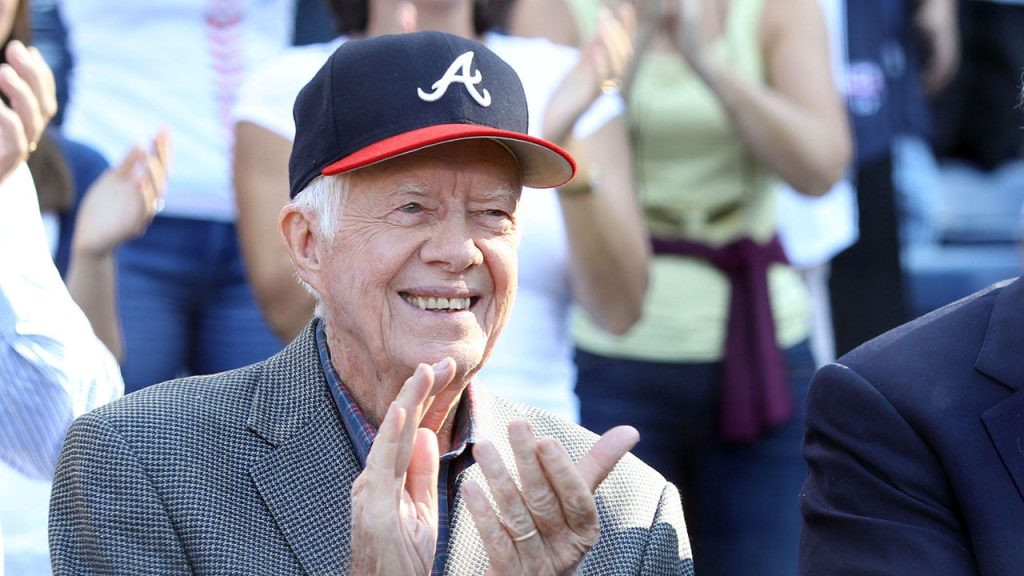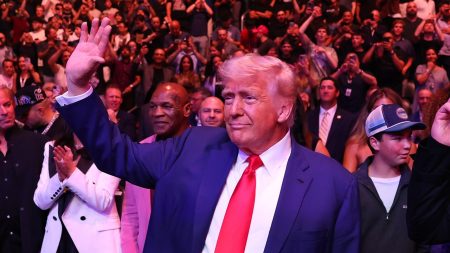Jimmy Carter, the 39th President of the United States, passed away at the age of 100, leaving behind a legacy that extended far beyond the political arena and resonated deeply within the sports world. Remembered as a devoted sports fan, particularly of his home state teams, Carter’s connection to athletics transcended mere spectatorship and intertwined with significant moments in sports history. His presidency witnessed historic sporting events, and his presence at these occasions underscored his appreciation for athletic achievement and the unifying power of sports. From welcoming Super Bowl champions to the White House to witnessing record-breaking home runs, Carter’s engagement with the sports world reflected his genuine passion and understanding of its cultural significance.
Carter’s enduring affinity for the Atlanta Braves baseball team was widely recognized, and the organization expressed profound sorrow upon his passing. The Braves lauded him not only as a loyal fan but also as an embodiment of the best qualities of America and Georgia. They acknowledged his lifelong commitment to serving both his country and his home state with honor and integrity. While the world recognized him for his humanitarian efforts and pursuit of peace, the Braves cherished him as a dedicated fan whose presence in the stands, cheering on his beloved team, would be deeply missed. The organization extended their heartfelt condolences to his family, recognizing the personal loss they had suffered.
Beyond baseball, Carter’s contribution to the tradition of honoring championship teams is noteworthy. He was the first president to welcome a Super Bowl-winning team, the Pittsburgh Steelers, to the White House in 1980, initiating a practice that has become a time-honored tradition continued by subsequent presidents. His recognition of the Steelers’ achievement, along with the Pittsburgh Pirates who were also honored during the same visit, solidified the connection between the highest office in the land and the pinnacle of professional sports. This gesture demonstrated Carter’s understanding of the cultural impact of sports and its ability to inspire and unite the nation.
Carter’s presence at pivotal moments in sports history further solidified his connection to the athletic world. He was notably in attendance when Hank Aaron broke Babe Ruth’s long-standing home run record in 1974, a moment that transcended sports and became a symbol of perseverance and overcoming racial barriers. His presence signified the importance of the event not only for baseball but also for the broader social and cultural landscape of the time. Additionally, Carter’s ceremonial first pitch at Game 6 of the 1995 World Series further underscored his enduring connection to the sport and his recognition of its national significance.
However, Carter’s involvement in the sports world wasn’t always celebratory. His presidency coincided with the 1980 Summer Olympics in Moscow, which were marred by political tensions and ultimately boycotted by the United States in protest of the Soviet Union’s invasion of Afghanistan. Carter’s decision to lead the boycott, while controversial, reflected his commitment to human rights and his willingness to use sports as a platform for political action. This decision highlighted the complex intersection of sports and politics and the role of athletes and sporting events in international affairs.
Arthur Blank, owner of the Atlanta Falcons, also paid tribute to Carter, emphasizing his humanitarian work and unwavering commitment to positive change. Blank described Carter as a man of deep faith who consistently acted with principle and grace, always striving to do the right thing for the right reasons. He acknowledged Carter’s profound impact on countless lives, emphasizing his kind and unifying spirit that transcended political divides and touched people from all walks of life. Blank’s heartfelt message of condolence reflected the widespread respect and admiration Carter commanded both within and beyond the sports world. His legacy as a man of integrity, compassion, and unwavering dedication to service will continue to inspire generations to come.










